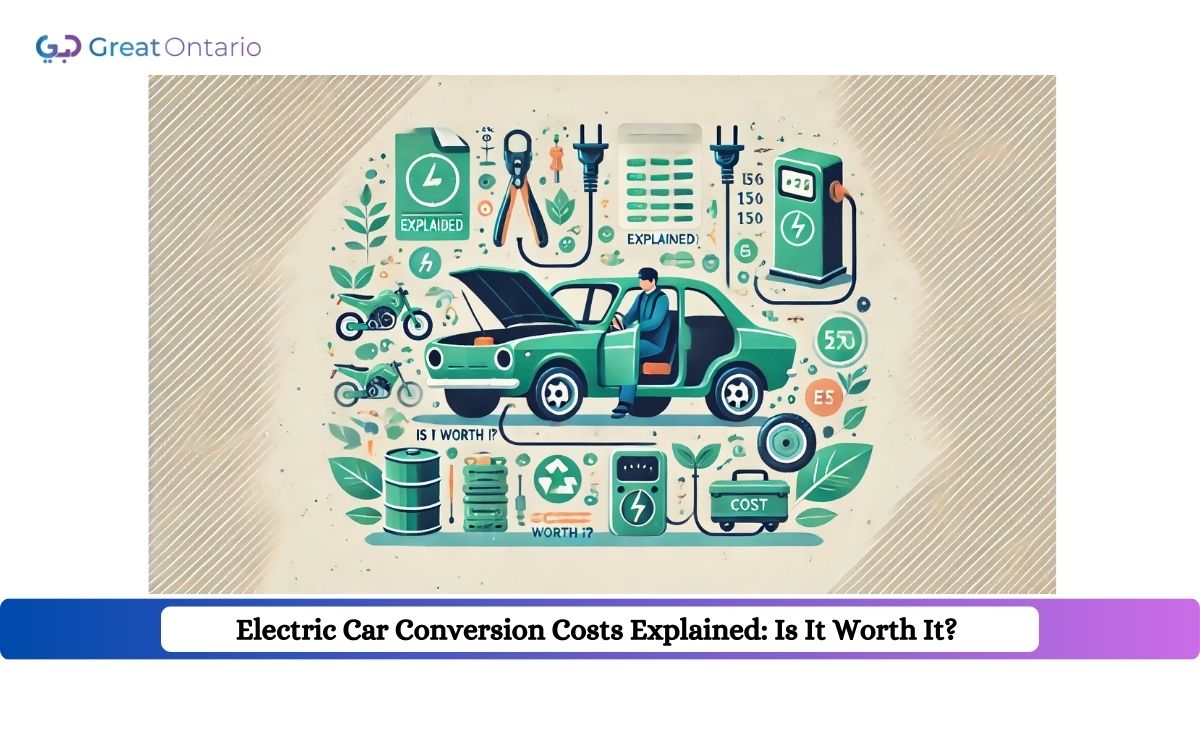With the rise of EVs, many car owners want to convert their gas cars to electric ones. But what is the cost of electric car conversion? Is it worth the investment, considering its significance?
Table of Contents
| Sr# | Headings |
|---|---|
| 1 | Introduction |
| 2 | What is Electric Car Conversion? |
| 3 | Why Convert to an Electric Car? |
| 4 | Cost Breakdown of Electric Car Conversion |
| 5 | Battery Costs |
| 6 | Electric Motor Costs |
| 7 | Labor Costs |
| 8 | Additional Conversion Costs |
| 9 | Maintenance and Running Costs |
| 10 | Environmental Benefits |
| 11 | Is It Worth the Investment? |
| 12 | Pros and Cons of Electric Car Conversion |
| 13 | Financial Incentives and Rebates |
| 14 | Alternatives to Electric Car Conversion |
| 15 | Conclusion |
| 16 | FAQs |
This article will define the charges of changing a gasoline vehicle to an electric one. It will discuss the benefits and challenges. Then, it’s going to help you decide whether an electric vehicle conversion is right for you.
Converting fuel motors to electric power is attractive. It cuts carbon footprints. Conversion fees vary significantly. So, it’s crucial to recognize the whole picture before taking the plunge.
What is Electric Car Conversion?
A method to convert a car. It replaces the gas engine and gas parts with electric-powered components. This usually includes installing an electric motor, a battery, and various electronics. It turns your fuel automobile into an electric-powered automobile.
Why Convert to an Electric Car?
Lower emissions and environmental blessings
Electric cars don’t have any tailpipe emissions. So, they are suitable for the environment. Converting a car to electric cuts air pollution and your carbon footprint.
Cost Savings Over Time
Though there are upfront costs, many locate savings over the years. This is due to decreased gasoline and maintenance charges. But how do these financial savings stack up against the initial investment?
Cost Breakdown of Electric Car Conversion
Converting a vehicle to an electric-powered one costs $5,000 to $20,000 or more. It depends on battery length, motor power, and labor prices. Here’s a closer look at every issue.
Battery Costs
The battery Ph.C. is the component of the conversion that usually incurs the highest cost. Lithium-ion batteries, like those in electric cars, can cost $1,000 to $10,000. Their rate depends on length and capacity. A larger, high-capacity battery will offer a longer usage range but will come at a premium.
Electric Motor Costs
Electric automobiles vary according to their electricity output and efficiency. A popular motor for conversion may cost a little between $1,000 and $5,000. High-performance automobiles can increase this charge. This is true if you want a more effective or sporty EV conversion.
Labor Costs
Labor charges will vary based on your location and the shop you choose. For a expert conversion, labor alone may need to add $2,000 to $10,000 to the fee. Some skilled lovers do the conversion themselves to save on labor costs.
Additional Conversion Costs
Beyond the center additives, there are several greater charges to consider:
-
The controller manages electricity drift: it generally charges $500 to $1,500.
-
Adapter Plate and Mounting Kit: Custom elements needed to suit the motor in your automobile can cost $500 to $1,500.
-
Battery Management System (BMS): It is vital for battery health. It costs $500 to $1,500.
Maintenance and running fees
Electric cars usually incur lower maintenance costs than fuel-powered cars. EVs do not need oil changes or complicated transmission maintenance. So, you can save loads on maintenance each year.
Environmental Benefits
One of the biggest reasons people remember conversion is the environmental benefit. Converting reuses a present car. It reduces waste and avoids the pollution from making a brand-new automobile.
Is it worth the investment?
This decision boils all the way down to your dreams and budget. Is the environmental impact your essential motivation? Or are you seeking long-term financial savings on fuel and maintenance? These factors will play a huge role in whether a conversion makes monetary sense.
Pros and Cons of Electric Car Conversion
Pros
-
Lower emissions and reduced environmental impact
-
Savings on gasoline and protection costs
-
Option to customize and pick your electrical components.
Cons
-
High premature conversion prices
-
Limited range compared to factory-constructed EVs.
-
Charging infrastructure needs can also vary based on the area.
Financial Incentives and Rebates
Many governments provide rebates and tax incentives for EV proprietors. This consists of people who convert a gas automobile. Check local applications. Incentives may cause a significant reduction in conversion fees.
Alternatives to Electric Car Conversion
If conversion needs many assets or complicated techniques, recall green alternatives. Buy a used electric-powered vehicle. Or, explore hybrids, which combine electric power and fuel efficiency.
Conclusion
The cost of electric car conversion is a key problem. But, for those eager to cut emissions and gasoline expenses, it could be worth it. Conversions can personalize an EV. But, weigh the charges and savings to determine.
FAQs
Q. How much does it cost to convert a car to electric?
Costs vary. Most conversions cost $5,000 to $20,000. It depends on battery size, motor power, and labor costs.
Q. How long does it take to convert a car to electric?
It can take weeks to months, especially for custom parts.
Q. Can any car be converted to electric?
Most cars can be converted. But, some models may need more custom work. This can affect the cost and feasibility.
Q. What are the benefits of converting to an electric car?
Benefits include reduced emissions, lower maintenance, and fuel savings. It’s also a way to keep your current car while transitioning to electric power.
Q. Are there tax incentives for converting a car to electric?
Yes, many governments incentivize EV owners, including those who convert gas cars to electric. Check with local authorities for specific programs.








